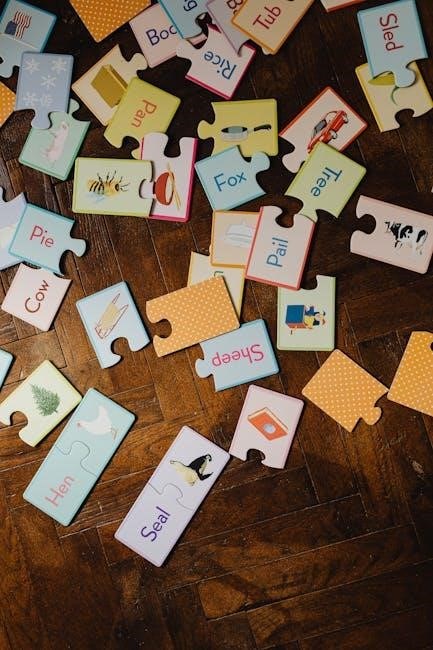
Mastering Year 6 spelling words is essential for academic success‚ as it strengthens writing and communication skills. These words‚ often tricky and exception-based‚ are curated to align with the National Curriculum‚ providing a solid foundation for future learning. Resources like free PDF downloads and worksheets offer accessible ways to practice and reinforce spelling patterns‚ vowel digraphs‚ and suffixes‚ ensuring confidence and proficiency in spelling.
1.1 Importance of Mastering Year 6 Spelling Words
Mastering Year 6 spelling words is crucial for building a strong foundation in English‚ as it enhances writing‚ reading‚ and communication skills. Accurate spelling boosts confidence and fluency‚ enabling students to express ideas clearly. These words‚ often exception-based and tricky‚ are vital for progressing through higher education and align with the National Curriculum‚ ensuring students are well-prepared for future academic challenges.
1.2 Overview of the Year 6 Spelling Curriculum
The Year 6 spelling curriculum is comprehensive‚ focusing on common exception words and spelling patterns. It includes suffixes like -able and -ible‚ vowel digraphs such as ie and ei‚ and tricky patterns like igh and eigh. The curriculum covers a wide range of topics‚ including animals‚ places‚ and professions‚ ensuring students build a robust vocabulary. Resources like free PDFs and worksheets are available to support practice and mastery of these essential spelling skills.

Common Exception Words in Year 6
Year 6 spelling includes high-frequency exception words that don’t follow standard rules‚ such as “because” and “necessary.” These words are essential for fluent writing and communication.
2.1 High-Frequency Exception Words
High-frequency exception words in Year 6‚ such as “because” and “necessary‚” are prioritized due to their common usage. These words often defy spelling rules‚ making memorization crucial. Regular practice through activities like word scrambles and anagrams helps students commit them to memory. Resources like PDF downloads and online tools provide structured lists and exercises to master these challenging yet essential words effectively.
2.2 Tricky and Less Frequently Used Words
Tricky and less frequently used words‚ such as “accommodate” or “definitely‚” often pose challenges due to irregular patterns or silent letters. Mnemonics and visualization techniques are effective strategies to memorize these words. Resources like PDF downloads and online tools provide targeted lists and exercises to help students master these complex spellings‚ ensuring they can tackle them with confidence in their writing.
Spelling Rules and Patterns
Explore essential spelling rules‚ including suffixes like -able and -ible‚ and vowel digraphs such as ie and ei. These patterns help students decode and spell complex words confidently.
3.1 Suffixes: -able and -ible
Suffixes like -able and -ible form nouns indicating ability or possibility. Words like “capable” and “visible” use -able‚ while “possible” and “credible” use -ible. These suffixes often appear in Year 6 spelling lists‚ helping students expand their vocabulary and understand word meanings. Regular practice with exercises and word lists ensures mastery of these patterns‚ essential for confident spelling and writing skills.
3.2 Vowel Digraphs: ie and ei
Vowel digraphs like “ie” and “ei” often confuse learners‚ but patterns can help. “ie” usually appears in words like “believe” and “friend‚” while “ei” is common in “receive” and “veil.” The rhyme “i before e except after c” is a useful mnemonic‚ though exceptions exist. Activities like word scrambles and interactive games can reinforce these patterns‚ helping Year 6 students master vowel digraphs for accurate spelling and confident writing.

Activities to Practice Year 6 Spelling Words
Engaging activities like word scrambles‚ anagrams‚ and spelling stories make learning fun. Techniques such as “Look‚ Cover‚ Write‚ Check” and speed writing games help reinforce spelling patterns and build confidence.
- Word scrambles and anagrams challenge students to rearrange letters.
- Spelling stories encourage creative writing while practicing target words.
- Look‚ Cover‚ Write‚ Check promotes independent learning and accuracy.
4.1 Look‚ Cover‚ Write‚ Check Technique
The “Look‚ Cover‚ Write‚ Check” method is a popular and effective way to practice spelling. Students start by studying the word‚ then cover it to write it from memory. Finally‚ they check their spelling against the original. This technique improves retention and accuracy. Many free PDF resources include pre-designed sheets for this method‚ making it easy to implement at home or in the classroom. Regular practice with this method builds confidence and spelling mastery.
4.2 Word Scrambles and Anagrams
Word scrambles and anagrams are engaging activities that challenge students to rearrange letters to form correct spellings. These exercises enhance problem-solving skills and reinforce memory of word patterns. Many free PDF resources include scrambled words for practice‚ allowing students to interact with spelling lists creatively. This method encourages active learning and can be used alongside other techniques for varied and effective spelling practice.

Resources for Year 6 Spelling Words
Free PDF downloads and worksheets are widely available‚ offering comprehensive lists of Year 6 spelling words. These resources are curated to align with the National Curriculum‚ covering common‚ tricky‚ and exception words to support learning and practice.
5.1 Free PDF Downloads and Worksheets
Free PDF downloads and worksheets are excellent resources for practicing Year 6 spelling words. These materials often include comprehensive word lists‚ activities‚ and interactive exercises. Many PDFs feature word scrambles‚ anagrams‚ and fill-in-the-blank tasks to engage learners. Worksheets typically align with the National Curriculum‚ covering common‚ tricky‚ and exception words. They also provide structured lessons for suffixes‚ prefixes‚ and vowel digraphs‚ making spelling practice both effective and enjoyable for students.
5.2 Online Tools and Apps for Practice
Online tools and apps offer interactive ways to practice Year 6 spelling words. Platforms like Spelling Bee Study List and AI-based grammar checkers provide engaging exercises. Apps feature quizzes‚ word scrambles‚ and writing challenges‚ catering to different learning styles. Many tools offer progress tracking‚ audio pronunciations‚ and instant feedback‚ making spelling practice efficient and enjoyable. They are accessible on various devices‚ supporting home and classroom learning seamlessly.

The Role of Mnemonics and Visualization
Mnemonics and visualization are powerful tools for remembering spelling words. Techniques like creating mental images or associations help students recall difficult words effectively‚ enhancing retention and spelling accuracy.
6.1 Using Memory Aids for Difficult Words
Memory aids like mnemonics and acronyms help students remember tricky spellings. For example‚ linking words to personal experiences or creating visual associations can make complex words easier to recall. Techniques such as writing sentences with the first letters of a word or drawing mind maps also enhance retention. These strategies make learning enjoyable and effective‚ ensuring long-term mastery of challenging spelling words.
6.2 Creating Visual Associations
Visual associations‚ like drawing mind maps or creating vivid images‚ help students connect words with memorable visuals. For example‚ linking a tricky word to a funny picture or a personal experience enhances retention. Interactive activities‚ such as color-coding or illustrating word meanings‚ make learning engaging. These methods help students recall spellings more effectively‚ fostering confidence and mastery of complex words in alignment with the Year 6 curriculum.

Assessing Progress in Spelling
Regular spelling tests and feedback are crucial to track progress. Identifying strengths and weaknesses helps tailor learning. Using resources like PDF worksheets ensures alignment with curriculum goals and supports improvement.
7.1 Regular Testing and Feedback
Regular testing is vital for monitoring progress in Year 6 spelling. Using resources like PDF worksheets ensures consistent assessment. Immediate feedback helps identify areas needing improvement. Parents and teachers can use these tools to track accuracy and understanding‚ providing targeted support. Consistent evaluation builds confidence and proficiency‚ preparing students for future academic challenges. Regular checks ensure steady growth and mastery of spelling skills effectively.
7.2 Identifying Areas for Improvement
Identifying areas for improvement in Year 6 spelling involves analyzing patterns of mistakes and understanding common challenges. Regular testing highlights weaker areas‚ allowing targeted practice. Using resources like spelling PDFs and word lists‚ teachers and parents can track progress and pinpoint specific difficulties. This focused approach ensures personalized learning‚ helping students overcome tricky spellings and build confidence in their abilities effectively over time.

Engaging Games for Spelling Practice
Engage students with board games‚ card activities‚ and digital competitions. These interactive methods make spelling practice fun and motivating‚ helping Year 6 students master their spelling lists effectively.
8.1 Board Games and Card Activities
Engage Year 6 students with interactive board games and card activities. Spelling Bingo reinforces high-frequency words‚ while card games like Spelling War and Spell-Off encourage healthy competition. Flashcard races and word-matching games enhance retention and make practice enjoyable. These activities provide hands-on learning experiences‚ fostering confidence in spelling abilities while making the process fun and collaborative.
8.2 Digital Games and Competitions
Digital games and competitions offer engaging ways to practice Year 6 spelling words. Platforms like Spelling Shed and Kahoot provide interactive quizzes‚ puzzles‚ and multiplayer challenges. Students can compete individually or in teams‚ enhancing retention through fun‚ technology-based learning. These tools often include progress tracking‚ rewards‚ and customizable word lists‚ making spelling practice both effective and enjoyable while fostering healthy competition and teamwork.

Tips for Parents to Support Learning
Parents can support their child by creating a consistent study routine and encouraging active participation in spelling activities. Regular practice with PDF resources and interactive games helps reinforce learning and builds confidence in mastering Year 6 spelling words effectively.
9.1 Creating a Home Study Routine
Establishing a consistent home study routine helps children stay focused and organized. Parents can allocate 15-20 minutes daily for spelling practice‚ using PDF resources and interactive tools. Setting specific goals‚ like mastering a set of words weekly‚ and incorporating varied activities ensures sustained engagement and steady progress in spelling skills. Regular review and positive reinforcement enhance learning outcomes effectively.
9.2 Encouraging Active Participation
Encourage active participation by making learning interactive and engaging. Parents can use word scrambles‚ anagrams‚ and spelling games to involve children. Positive feedback and celebration of progress motivate learners. Incorporate activities like writing stories with spelling words or creating visual mnemonics to make practice enjoyable. Regularly involving children in setting goals and tracking achievements fosters a sense of ownership and responsibility‚ boosting their confidence in mastering Year 6 spelling words.

The Long-Term Benefits of Year 6 Spelling
Mastering Year 6 spelling words builds a strong foundation for future learning‚ enhancing writing‚ reading‚ and communication skills. It supports lifelong literacy and academic success effectively.
10.1 Building a Strong Foundation for Future Learning
Mastering Year 6 spelling words creates a robust foundation for future academic success. It enhances literacy skills‚ enabling students to decode complex texts and expand their vocabulary. Proficiency in spelling boosts writing quality‚ critical thinking‚ and communication abilities. This strong base supports learners as they progress to higher-level studies‚ ensuring they can tackle challenging subjects with confidence and clarity. Year 6 spelling resources‚ like PDF guides‚ further reinforce this essential skill.
10.2 Enhancing Writing and Communication Skills
Accurate spelling is vital for clear and effective communication. Year 6 spelling words help students express ideas confidently and coherently in writing. By mastering these words‚ learners produce more polished and professional texts‚ enhancing their ability to engage readers. Strong spelling skills also improve overall writing quality‚ fostering better communication and preparing students for advanced academic and professional challenges where clear expression is essential.